Jeremy Davis: The process to make the two soaps is virtually the same, and takes place over several days. First, my mother buys many gallons of palm oil and has them delivered to her house. Palm oil is very sweet, red in color, and used for many things here in West Africa. It is extracted from the palm kernel. She then takes large pieces of timber, usually split teak, and starts a fire under oil drums. She cooks the oil in the drums for a full day, and allows it to cool overnight. She then mixes soda with water, at a top secret (I just don’t know them, they aren’t really that secret) ratio. The soda water is then mixed with palm oil in a large container. This is where the process splits for the two different types of soap to be made.
BB: Can you tell us about the Banku Soap?
JD: As the mixture heats up and begins to solidify, the women put plastic bags on their hands, then socks, then rubber bands. This is layered about three times, and they go to work. They take the hot mixture and ball it into two different sized soap balls in their hands. They then stack the balls in a pyramid on a table to cool and dry. Once they are cool, the soap balls are white, opaque, and extremely hard. The soap is also very caustic and can burn your hands if you are sensitive.
BB: What’s the difference between Banku Soap and Key Soap?
JD: Key soap is similar to Banku Soap, but the soda used is less, and a small amount of perfume is used. This soap is therefore softer, scented, and a light yellow color. Once the soda water and oil is mixed together, the ‘batter’ is poured into big wooden trays lined with plastic. Once this big wedding cake of soap cools, they take it out of the trays, and place it on a special table. The table has 4 taut strings running from a bar down to the base of the table. As the soap cake is pushed on the table through this contraption, it cuts it into long bars. The bars are then pushed through a metal molder, like a cookie cutter, to give it shaped ridges. They then stamp the soap with a metal stamp, for my mom, her stamp is ‘CM’, for her initials.
BB: You said earlier that soap making is the main source of income for these women. What are their prices like?
JD: The Banku soap sells 3 balls for roughly 50 cents. A full bar of key soap (about a foot and a half long) sells for about a dollar, a bar considered a single serving for about 20 cents. People coming to market buying in quantity get a discount from that. Banku soap is used for washing dishes and clothes, and sometimes people. Key soap is usually used for washing clothes, and sometimes people.
BB: We hear that Ghana is known for being one of the biggest producers of Shea in the World. Do they ever use it in their soaps?
JD: Shea is famous in the western world, but here it’s really only used to lotion up babies. It would make a lot of sense to add it to soaps for bathing; I think it is being done in a few places. However, most of the women producing soap in Ghana produce what is being bought by the most people. Most women’s groups are too small and usually not familiar with packaging and marketing, so they make the most basic soaps. There is a big opportunity for some of them to tap into a larger, more profitable market through marketing-basically making unique soaps with different ingredients, colors, and perfumes, packaging them, and selling them at a higher profit. We’ll see what unfolds.
Thank you to Jeremy for answering our questions! If you have more questions for Jeremy, feel free to post them and we’ll do our best to get back in touch with our new soaping friend!
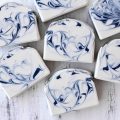
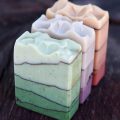
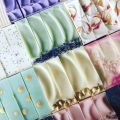
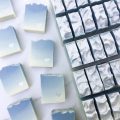
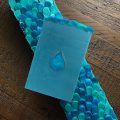
Hi,
I would like to add some information about the uses of shea butter and bathing in ghana. Shea butter is used for a variety of things in Ghana depending on the region you are in. It is used for cooking(in northern ghana instead of oils), hair, medicine, body moisturizer(especially during the harmatan a very dry season in Ghana and soap. People bathe everyday at least once Ghanaians are very clean people. Key soap is a laundry soap made by unilever, any laundry soap made in that same shape people generally call it key soap as a way to describe it. Some people use shea butter and milk when making traditional black soap and others use only palm kernal or coconut oils.
From Larona in Ghana
Indigenous Flair
Shea Butter Bath & Body Products
That picture is just fabulous! pyramid of soap…does that say save space for soap drying or what?
Do they turn the soap later? oh the questions!
Thank you, Anne-Marie and Jeremy for the great interview!
I agree with Little Shadow Creations. We have it really good here in America. It is fascinating the way they make their soaps. Thanks, Anne-Marie and Jeremy, for the post!
It sounds like they use this soap mostly for cleaning things. What do they bathe with? How often do people bathe over there?
~Wow, what an cool picture, and inteveiw. That must be great to actually experience this in real life. I can humbly admit that we take a lot of luxuries for granted being American.